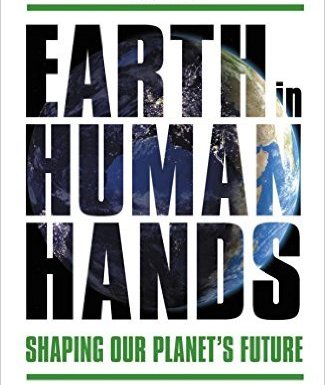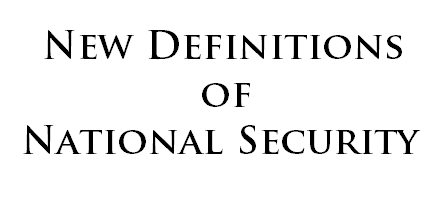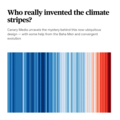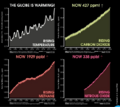Category:Anthropocene
<addthis />
Trajectories of the Earth System in the Anthropocene
The Anthropocene is a proposed epoch dating from the commencement of significant human impact on the Earth's geology and ecosystems including, but not limited to, anthropogenic climate change.
○
Profound alterations as a result of human/anthro activity include changes in:
- *erosion and sediment transport associated with a variety of anthropogenic processes, including colonisation, agriculture, urbanisation and global warming
- *the chemical composition of the atmosphere, oceans and soils, with significant anthropogenic perturbations of the cycles of elements such as carbon, nitrogen, phosphorus and various metals
- *environmental conditions generated by these perturbations; these include global warming, ocean acidification and spreading oceanic 'dead zones'
- *the biosphere and eco-systems both on land and in the sea, as a result of habitat destruction and loss, predation, species invasions and the physical and chemical changes noted above.
The 'Anthropocene' is seen as a geological epoch, i.e. at the same hierarchical level as the Pleistocene and Holocene epochs ... the Anthropocene is perceived to begin as the Holocene era ends.
The origins of the 'Anthropocene' are generally considered to be at c. 1800 CE, around the beginning of the Industrial Revolution...
The Anthropocene .. by the standards of the International Commission on Stratigraphy (ICS), the administrators of the geologic time scale — that old-school conceptual ruler notched with eons, eras, periods, epochs, and ages stretching back to what we refer to as the Earth’s beginning, about four and a half billion years ago (until recently spoke of the current) epoch as the Holocene. The proposition, however, is that this is no longer true — that we are now in a new epoch, one defined by humanity’s significant impact on the Earth’s ecosystems.
This has come, for obvious reasons, to be freighted with political portent. Academics, particularly scientific ones, are excited by this notion. But they are not satisfied with the term as a metaphor; they seek the authority of geologists, the scientists historically interested in marking vast tracts of time, humanity’s official timekeepers...
Professor Zalasiewicz of the Department of Geology, University of Leicester (recalls) when he’d first heard of the Anthropocene. He cited a 2002 paper in Nature written by Paul Crutzen, a Nobel Prize–winning chemist and a prominent practitioner of Earth-system science, which is the study of the interactions between the atmosphere and other spheres (bio-, litho-, etc). “I read it and I thought, How interesting. What a nice idea. And then, like a lot of geologists, I forgot about it — until the word began to appear in the literature, as if it was formal, without irony, without inverted commas.” In Nature, Crutzen urged the scientific community to formally adopt what he named the Anthropocene (anthro from the Greek anthrópos, meaning “human being”) and to mark its beginning at the start of the Industrial Revolution. The evidence he cited is too depressing to recount in full here: The human population has increased tenfold in the past 300 years; species are dying; most freshwater is being sucked up by humans; not to mention the man-induced changes in the chemical composition of the atmosphere — essentially, all the facts the world is ignoring, avoiding, or paying people to obfuscate.
Crutzen’s proposal barely registered in Zalasiewicz’s field. “It was a geologic concept launched by an atmospheric chemist within an Earth-science-systems context,” he explained. (Translation: An NHL player suggested an NBA rule.) But by the time it came up at the Geological Society of London in 2008, the ICS was in the strange position of debating a term that had already been accepted not just by laypeople but by other scientists — especially the Earth-system scientists who first trumpeted global warming. Anthropocene has proved wildly appealing. For laypeople, it’s big and futuristic and implies a science-induced bad ending; for climate-change scientists, it marks all their hard work in the lucidly solid and enduring traditions of geology...”
“The geologists, as ever, were very late to catch up with this. We grind slowly... (yet) the popularity of the Anthropocene (as a scientific concept) allows for all these new things — for people to meet across barriers, to talk about revolutionary things outside of the political sphere. How are we going to remake life? Let’s figure it out.”
The nuclear age has also been suggested as the beginning of the destructive Anthropocene...
Apocalyptic Thinking
Ⅰ Ⅱ Ⅲ Ⅳ Ⅴ Ⅵ Ⅶ Ⅷ Ⅸ Ⅹ Ⅰ Ⅱ Ⅲ Ⅳ Ⅴ Ⅵ Ⅶ Ⅷ Ⅸ Ⅹ Ⅰ Ⅱ Ⅲ Ⅳ Ⅴ Ⅵ Ⅶ Ⅷ Ⅸ Ⅹ
The nuclear age brings with it the power to destroy life on Earth in apocalyptic, existential terms
- New, more lethal, 'smart', 'usable' tactical and strategic nuclear weapons
Calculus of War; Cold War 2.0; Nuclear Weapons; Nuclear Proliferation; Nuclear Non-Proliferation
- J. Robert Oppenheimer at the Trinity site in New Mexico as the first atomic bomb is tested: "Now I am become Death, the destroyer of worlds."
The power of science gone to 'the dark side' of destructive capability and imminent nuclear weapons use is, without question, a turning point and anthropocentric moral choice.
Ⅰ Ⅱ Ⅲ Ⅳ Ⅴ Ⅵ Ⅶ Ⅷ Ⅸ Ⅹ Ⅰ Ⅱ Ⅲ Ⅳ Ⅴ Ⅵ Ⅶ Ⅷ Ⅸ Ⅹ Ⅰ Ⅱ Ⅲ Ⅳ Ⅴ Ⅵ Ⅶ Ⅷ Ⅸ Ⅹ
"The 'Anthropocene' has emerged ... humans have a decisive influence on the state, dynamics and future of Earth systems."
The responsibility of planet citizens is now to create a new "integral ecology" and "planetary awareness".
- https://www.greenpolicy360.net/w/Environmental_movement
- https://www.greenpolicy360.net/w/Category:Green_Politics
·
Subcategories
This category has the following 31 subcategories, out of 31 total.
A
C
E
G
M
N
O
P
S
Pages in category "Anthropocene"
The following 136 pages are in this category, out of 136 total.
A
C
- Carbon Brief
- Christianity and Climate Change Belief or Disbelief
- Clearcutting
- Climate Change - Global Warming Keyword-Terms
- Climate Change Denier Talking Points -- and Rebuttals
- Climate Conference - Paris 2015
- Climate Desk
- Climate Law Blog @Columbia Law School
- Climate migration
- Climate News
- Climate News Events Archive ... 1970 to Today
- Climate Plans Enforcement - Resources
- Climate Problems, Climate Solutions
- Copernicus EU
- Creatively Green
E
- Each of us can make a positive difference
- Earth and Space, Politics
- Earth Day
- Earth Day 2020
- Earth Day Is Every Day
- Earth Day Memories on the 50th Anniversary
- Earth Day Summit - April 22 2021
- Earth Right Now
- Earth Science Eco-Fields
- Earth Science Vital Signs
- EarthPOV
- Earthrise
- EarthTime
- Earthviews
- Earthviews from Astronauts
- Eco-nomics
- Endangered species
- Environmental agreements
- Environmental full-cost accounting
- Environmental movement
- Environmental protection
- Environmental Rules Rolled Back
- ESA Living Planet Announcement - May 2022
- Ethics and Climate Change
- European Union Green Deal - Fit for 55
- Extinction
- ExxonMobil and US House Science Committee v US Attorneys General and Environmental Groups
F
G
- Generation Green
- Genesis, Stewardship and Beyond
- Geoengineering
- George E. Brown Jr
- Glasgow Climate Summit - Pledges, Promises, Declarations - What's Next Up
- Global Climate Action Summit
- Global Forest Watch
- Going Green: Texas v. Pennsylvania
- Google Earth
- Google Earth Timelapse
- Green Education
- Green Futurist Literary Writers
- Green New Deal
- Green Politics 360
- Green Quotes
- GreenAction
- Greening Our Blue Planet
- GreenPolicy360 (eOS)
I
N
O
P
S
T
Media in category "Anthropocene"
The following 38 files are in this category, out of 1,038 total.
(previous page) (next page)- Venice flooding.png 530 × 516; 109 KB
- Vietnam Moratorium Committee-Documentary Intro.jpg 640 × 392; 34 KB
- Views of the US President - June 2021.jpg 522 × 770; 88 KB
- Virginia Norwood - 1948.jpg 640 × 426; 74 KB
- Vorsorgeprinzip at GreenPolicy360 - sjs.png 611 × 758; 164 KB
- Wallace Smith Broecker.jpg 525 × 424; 93 KB
- War in the Ukraine - February 24 2022.png 731 × 307; 118 KB
- War in Ukraine Feb 26 2022.png 640 × 195; 68 KB
- War on the EPA in the USA.png 491 × 471; 134 KB
- Watching the Planet Breathe.jpg 560 × 380; 173 KB
- Watching the Planet Breathe3.jpg 1,000 × 405; 290 KB
- We are all crew.jpg 448 × 181; 17 KB
- We are all in this together-IPCC report-August 2021.jpg 513 × 768; 183 KB
- We are now truly in uncharted territory-Falter.jpg 800 × 318; 161 KB
- We must flatten the curve, yes ... August 2020.jpg 800 × 421; 99 KB
- Wetlands - Wetlands Day.png 640 × 492; 333 KB
- What we owe the future 8-5-2022.jpg 421 × 304; 32 KB
- Wheeler-Mulvaney-repeal of Clean Power Plan-June19,2019.jpg 800 × 640; 145 KB
- When your house is on fire.jpg 589 × 473; 77 KB
- Where carbon emission come from - gleick tw 2018.jpg 640 × 460; 41 KB
- Which countries pollute the most ~2017.jpg 800 × 422; 69 KB
- Who really invented the climate stripes - Climate Change Education.png 600 × 600; 234 KB
- Whole Earth Catalog-Internet Archive-4-23-2021.jpg 592 × 305; 48 KB
- Why is the Amazon burning - Katharine Hayhoe explains.jpg 498 × 763; 149 KB
- Wiki IPCC m.jpg 602 × 339; 112 KB
- Wildlife silence. sound ecologists warning.jpg 640 × 232; 63 KB
- Winning on the climate legis - AOC.png 480 × 519; 249 KB
- Worlds glaciers melting faster - Nature report - Apr 2021-1.jpg 800 × 561; 94 KB
- Worlds glaciers melting faster - Nature report - Apr 2021-2.jpg 800 × 628; 108 KB
- WV v EPA SCOTUS poll - June 27 2022 before court decision.png 623 × 480; 126 KB
- Your life is your message.jpg 468 × 640; 66 KB
- Youth Climate Movement.jpg 516 × 284; 79 KB
- Youth Climate Strikes-March15,2019.jpg 707 × 639; 159 KB
- Zack Labe - climate viz - June 2024.png 675 × 600; 261 KB
- Zelenskyy says.png 640 × 181; 98 KB

































